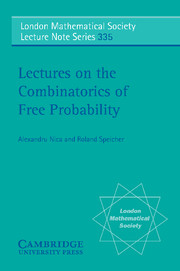Book contents
- Frontmatter
- Contents
- Introduction
- Part 1 Basic concepts
- Part 2 Cumulants
- Lecture 8 Motivation: free central limit theorem
- Lecture 9 Basic combinatorics I: non-crossing partitions
- Lecture 10 Basic combinatorics II: Möbius inversion
- Lecture 11 Free cumulants: definition and basic properties
- Lecture 12 Sums of free random variables
- Lecture 13 More about limit theorems and infinitely divisible distributions
- Lecture 14 Products of free random variables
- Lecture 15 R-diagonal elements
- Part 3 Transforms and models
- Notes and comments
- References
- Index
Lecture 8 - Motivation: free central limit theorem
Published online by Cambridge University Press: 06 July 2010
- Frontmatter
- Contents
- Introduction
- Part 1 Basic concepts
- Part 2 Cumulants
- Lecture 8 Motivation: free central limit theorem
- Lecture 9 Basic combinatorics I: non-crossing partitions
- Lecture 10 Basic combinatorics II: Möbius inversion
- Lecture 11 Free cumulants: definition and basic properties
- Lecture 12 Sums of free random variables
- Lecture 13 More about limit theorems and infinitely divisible distributions
- Lecture 14 Products of free random variables
- Lecture 15 R-diagonal elements
- Part 3 Transforms and models
- Notes and comments
- References
- Index
Summary
One of the main ideas in free probability theory is to consider the notion of free independence in analogy with the notion of classical or tensor independence. In this spirit, the first investigations of Voiculescu in free probability theory focused on free analogs of some of the most fundamental statements from classical probability theory. In particular, he proved a free analog of a central limit theorem and introduced and described a free analog of “convolution.” His investigations were quite analytical and centered around the concept of the “R-transform,” an analytic function which plays the same role in free probability theory as the logarithm of the Fourier transform in classical probability theory. However, in this analytic approach it is not so obvious why the R-transform and the logarithm of the Fourier transform should be analogous.
Our approach to free probability theory is much more combinatorial in nature and will reveal in a clearer way the parallelism between classical and free probability theory.
In order to see what kind of combinatorial objects are relevant for free probability theory, we will begin by giving an algebraic proof of the free central limit theorem. This approach will show the similar nature of classical and free probability theory very clearly, because the same kind of proof can be given for the classical central limit theorem. Most of the arguments will be the same, only in the very end one has to distinguish whether one is in the classical or in the free situation.
- Type
- Chapter
- Information
- Lectures on the Combinatorics of Free Probability , pp. 115 - 134Publisher: Cambridge University PressPrint publication year: 2006

